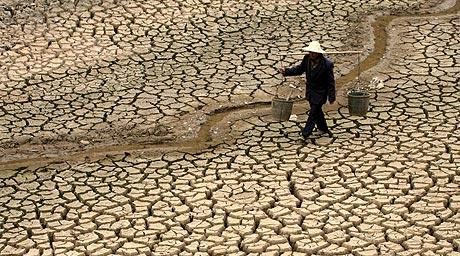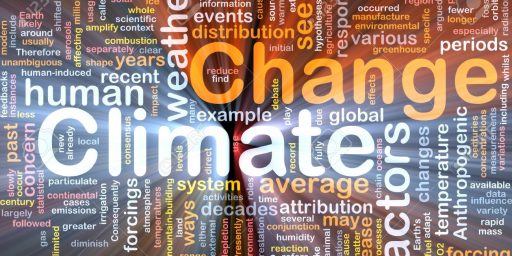Technology Saves World, Poor Suffer Most
When I saw the NYT headline “Poor Nations to Bear Brunt as World Warms,” I was naturally reminded of the classic spoof headline, “World to End Tomorrow: Women and Minorities Affected the Most.”
Andrew Revkin’s story does not make me feel guilty for having that reaction.
The world’s richest countries, which have contributed by far the most to the atmospheric changes linked to global warming, are already spending billions of dollars to limit their own risks from its worst consequences, like drought and rising seas.
But despite longstanding treaty commitments to help poor countries deal with warming, these industrial powers are spending just tens of millions of dollars on ways to limit climate and coastal hazards in the world’s most vulnerable regions — most of them close to the equator and overwhelmingly poor.
[…]
Two-thirds of the atmospheric buildup of carbon dioxide, a heat-trapping greenhouse gas that can persist in the air for centuries, has come in nearly equal proportions from the United States and Western European countries. Those and other wealthy nations are investing in windmill-powered plants that turn seawater to drinking water, in flood barriers and floatable homes, and in grains and soybeans genetically altered to flourish even in a drought.
In contrast, Africa accounts for less than 3 percent of the global emissions of carbon dioxide from fuel burning since 1900, yet its 840 million people face some of the biggest risks from drought and disrupted water supplies, according to new scientific assessments. As the oceans swell with water from melting ice sheets, it is the crowded river deltas in southern Asia and Egypt, along with small island nations, that are most at risk.
“Like the sinking of the Titanic, catastrophes are not democratic,” said Henry I. Miller, a fellow with the Hoover Institution at Stanford University. “A much higher fraction of passengers from the cheaper decks were lost. We’ll see the same phenomenon with global warming.”
Those of us who emphasize the advantages brought by the advances in technology that have helped contribute to global warming (i.e., hundreds of millions of human beings spared from starvation and disease) have also expressed confidence that the same ingenuity would help insulate us from its bad effects. That seems to be happening. And, yet, the reaction of the environmental Establishment is “It’s not fair!”
Pollution and clean-up are two sides of the same coin. As societies seek to advance, they will naturally consume resources in ways that are long-term foolish and short-term smart. In a little more than two hundred years, industrialization moved the societies which adopted it further than in all previous human history. The wealth and technological know-how created by these advances has now given us the ability to work to undo some of the damage that was the unfortunate byproduct of modernization.
This strikes me as very much a good thing.
Further, as history has repeatedly shown, the adaptation curve is very steep. Yes, the wealthy societies are the first to benefit from the advances that we create. That’s not terribly surprising, really. Yet, very quickly, cutting edge technology becomes yesterday’s news. Those old technologies then move downstream in the economy at a rapid rate at a fraction of the initial cost.
Sometimes, as with communications technology, whole generations are skipped. Countries that never had a landline telephone system outside the big cities can put up cell towers quickly and cheaply, for example. Satellite television dishes adorn the sides of shanty apartments in the slums of Third World cities.
The same thing happens within the West. The wealthiest are early adopters of new technologies, whether it be personal computers, mobile telephones, high definition television, or what have you. At increasingly shorter intervals, those technologies become widely available as economies of scale catch up. People living in subsidized housing and collecting food stamps have PCs, cell phones, and MP3 players nowadays. Should we emphasize the “unfairness” of rich people getting those perks first or the fact that those people paid five times as much for the same products–paving the way for the economies of scale that allowed poor people to eventually buy them–so that they could enjoy them a couple years earlier?






Note that the article has a date line April 1.
Maybe this is the NYT’s idea of an April Fools Joke
Sadly, the NYT celebrates April Fools Day 365 days a year.
The problem with the “technology will save us” argument is that technology might not save us.
The problem with the “technology will save us†argument is that technology might not save us.
But there’s plenty of evidence in the article that it already is doing precisely that. And they’re bitching that it’s going to save the people who are investing in the technology first. Well, duh.
Technology is the application of human ingenuity to solving problems. There’s lousy engineering (which includes schemes to reduce carbon emissions that produce more carbon emissions than they reduce) and good engineering. But make no mistake: it is technology that will solve the problem of global warming (if there is a problem and it can be solved).
If you’re looking for a legitimate bit of Western wisdom this is it.
Ben Franklin: “God helps them that help themselves“ (Poor Richard, 1736 although it may be earlier it’s not Biblical)
Ignatius Loyola: “Work as though everything depends on you; pray as though everything depends on God”.
William Shakespeare: “Nothing will come of nothing” (King Lear)
Sorry I was not more clear: when I say “save us” I was hoping for reduced or reversed effects, not just desalination plants and drought resistant seeds to help us survive centuries of inhospitable climate change.
If you admit the premise (that the industrialized nations caused the problem but the poor nation will be hurt) then the bitching makes some sense to me.
Here’s an attempt at an analogy: suppose you and I own a duplex and I start a fire that burns down both our homes. What is fair for me to do with my money first, pay you or rebuild my own home?
Of course, if you don’t agree with the premise, I can see where this becomes less compelling.
James,
Obviously I agree with Mark. It’s hard to see how any kind of technological improvement will be able to save Bangladesh, for instance.